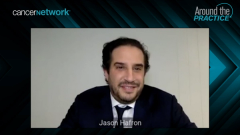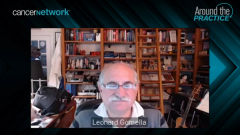
Sequencing Therapy for mCRPC
Daniel P. Petrylak, MD, leads the discussion on sequencing treatment for a patient with mCRPC, such as in case 2, who progresses on docetaxel therapy.
Episodes in this series

Raoul S. Concepcion, MD: If you had a patient who had received docetaxel and then progressed, where do you tend to go for your next line of therapy?
Daniel P. Petrylak, MD: If they’ve received docetaxel then progressed in hormone-sensitive disease, I’ll go with a next-generation antiandrogen therapy as the first treatment. Then I would consider going on to cabazitaxel afterward. A lot of it will also depend upon rapidity of the disease progression, what their molecular profiling is. Clearly, if it’s appropriate for them to receive a PARP inhibitor at some point, I would do so. The other thing we always must look out for is microsatellite instability [MSI]. I’ve seen some very dramatic responses to pembrolizumab in patients who have microsatellite instability. In fact, I’ve got a CR [complete response] right now in a patient who had been on both doce [docetaxel] and cabazitaxel. That’s another molecular marker we’ve got to be sensitive to.
Raoul S. Concepcion, MD: Oliver?
Oliver Sartor, MD: Dan nailed it. We must remember these rare groups of patients that have, either MSI-high, mismatch repair, or high tumor mutational burden [TMB]. Some of these PD-1 inhibitors, pembrolizumab in particular, I mention it by name because it’s FDA approved in that setting, high MSI, TMB, or mismatch repair deficient. Some of the responses will knock your socks off. I’ve got one guy who is in complete remission, off hormonal therapy, still in complete remission. And he’d already failed abiraterone and docetaxel. You can’t miss it because it can make a huge difference in the lives of patients. The genetic testing is not going to benefit most patients, but for rare patients, it can make a huge difference in their lives.
Raoul S. Concepcion, MD: You and Dan both bring up a great point, that for a while there we just fixated on individual biomolecular markers, looking at precision medicine and trying to determine the next line of therapy. And again, what you’re both saying is that as these patients progress through first, second, third lines of therapies, we have to be cognizant of what molecular testing can be done, whether it’s homologous recombination, mismatch repair, like you said Oliver, MSI, CDK12, because these are actionable mutations. And again, we have multiple drugs. We have drugs in different categories, whether it’s PARP inhibitors, whether it’s immunotherapies, checkpoint inhibitors, and there are going to probably be more and more over the next few years.
Transcript Edited for Clarity
Newsletter
Stay current with the latest urology news and practice-changing insights — sign up now for the essential updates every urologist needs.











